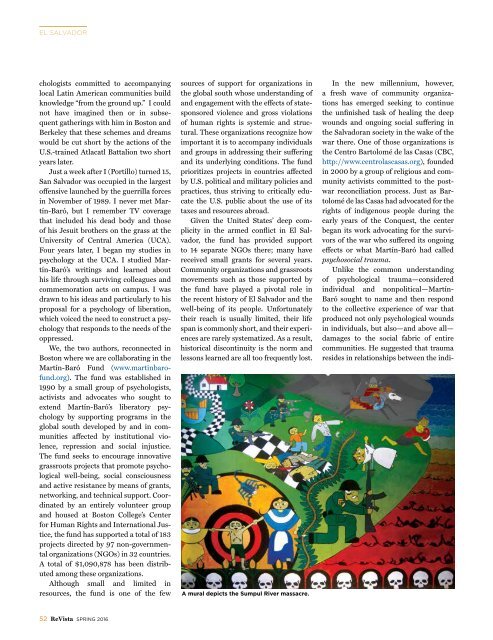EL SALVADOR
8clowSgZh
8clowSgZh
You also want an ePaper? Increase the reach of your titles
YUMPU automatically turns print PDFs into web optimized ePapers that Google loves.
<strong>EL</strong> <strong>SALVADOR</strong><br />
chologists committed to accompanying<br />
local Latin American communities build<br />
knowledge “from the ground up.” I could<br />
not have imagined then or in subsequent<br />
gatherings with him in Boston and<br />
Berkeley that these schemes and dreams<br />
would be cut short by the actions of the<br />
U.S.-trained Atlacatl Battalion two short<br />
years later.<br />
Just a week after I (Portillo) turned 15,<br />
San Salvador was occupied in the largest<br />
offensive launched by the guerrilla forces<br />
in November of 1989. I never met Martín-Baró,<br />
but I remember TV coverage<br />
that included his dead body and those<br />
of his Jesuit brothers on the grass at the<br />
University of Central America (UCA).<br />
Four years later, I began my studies in<br />
psychology at the UCA. I studied Martín-Baró’s<br />
writings and learned about<br />
his life through surviving colleagues and<br />
commemoration acts on campus. I was<br />
drawn to his ideas and particularly to his<br />
proposal for a psychology of liberation,<br />
which voiced the need to construct a psychology<br />
that responds to the needs of the<br />
oppressed.<br />
We, the two authors, reconnected in<br />
Boston where we are collaborating in the<br />
Martín-Baró Fund (www.martinbarofund.org).<br />
The fund was established in<br />
1990 by a small group of psychologists,<br />
activists and advocates who sought to<br />
extend Martín-Baró’s liberatory psychology<br />
by supporting programs in the<br />
global south developed by and in communities<br />
affected by institutional violence,<br />
repression and social injustice.<br />
The fund seeks to encourage innovative<br />
grassroots projects that promote psychological<br />
well-being, social consciousness<br />
and active resistance by means of grants,<br />
networking, and technical support. Coordinated<br />
by an entirely volunteer group<br />
and housed at Boston College’s Center<br />
for Human Rights and International Justice,<br />
the fund has supported a total of 183<br />
projects directed by 97 non-governmental<br />
organizations (NGOs) in 32 countries.<br />
A total of $1,090,878 has been distributed<br />
among these organizations.<br />
Although small and limited in<br />
resources, the fund is one of the few<br />
sources of support for organizations in<br />
the global south whose understanding of<br />
and engagement with the effects of statesponsored<br />
violence and gross violations<br />
of human rights is systemic and structural.<br />
These organizations recognize how<br />
important it is to accompany individuals<br />
and groups in addressing their suffering<br />
and its underlying conditions. The fund<br />
prioritizes projects in countries affected<br />
by U.S. political and military policies and<br />
practices, thus striving to critically educate<br />
the U.S. public about the use of its<br />
taxes and resources abroad.<br />
Given the United States’ deep complicity<br />
in the armed conflict in El Salvador,<br />
the fund has provided support<br />
to 14 separate NGOs there; many have<br />
received small grants for several years.<br />
Community organizations and grassroots<br />
movements such as those supported by<br />
the fund have played a pivotal role in<br />
the recent history of El Salvador and the<br />
well-being of its people. Unfortunately<br />
their reach is usually limited, their life<br />
span is commonly short, and their experiences<br />
are rarely systematized. As a result,<br />
historical discontinuity is the norm and<br />
lessons learned are all too frequently lost.<br />
A mural depicts the Sumpul River massacre.<br />
In the new millennium, however,<br />
a fresh wave of community organizations<br />
has emerged seeking to continue<br />
the unfinished task of healing the deep<br />
wounds and ongoing social suffering in<br />
the Salvadoran society in the wake of the<br />
war there. One of those organizations is<br />
the Centro Bartolomé de las Casas (CBC,<br />
http://www.centrolascasas.org), founded<br />
in 2000 by a group of religious and community<br />
activists committed to the postwar<br />
reconciliation process. Just as Bartolomé<br />
de las Casas had advocated for the<br />
rights of indigenous people during the<br />
early years of the Conquest, the center<br />
began its work advocating for the survivors<br />
of the war who suffered its ongoing<br />
effects or what Martín-Baró had called<br />
psychosocial trauma.<br />
Unlike the common understanding<br />
of psychological trauma—considered<br />
individual and nonpolitical—Martín-<br />
Baró sought to name and then respond<br />
to the collective experience of war that<br />
produced not only psychological wounds<br />
in individuals, but also—and above all—<br />
damages to the social fabric of entire<br />
communities. He suggested that trauma<br />
resides in relationships between the indi-<br />
52 ReVista SPRING 2016


